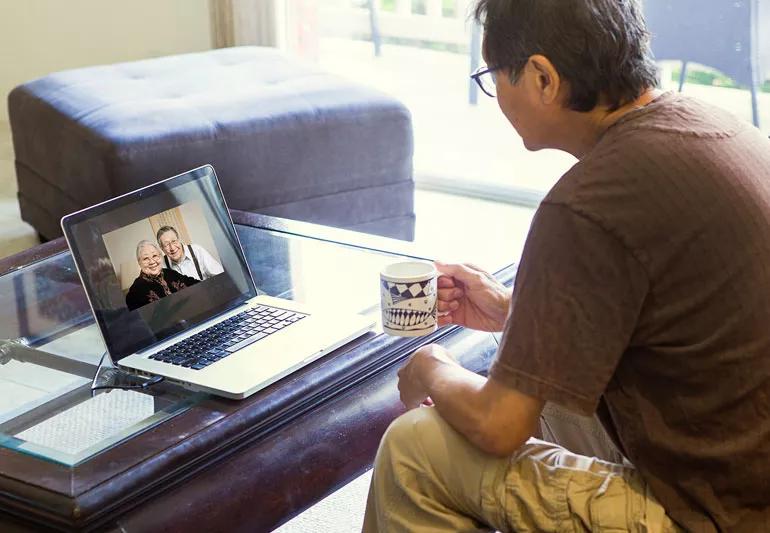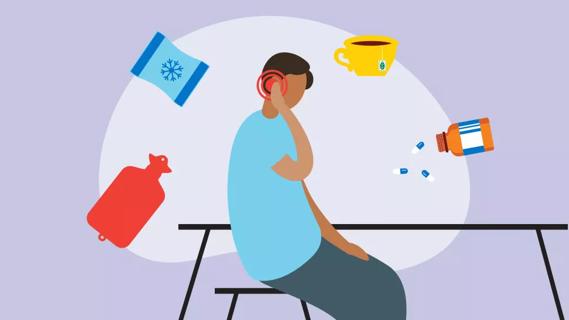Advertisement
How to entertain your brain and beat coronavirus stress

People love new things. We pick a different vacation destination because we want new sights and experiences. We try the latest exercise class or eat at a different restaurant because we’re bored with our routine.
Advertisement
Cleveland Clinic is a non-profit academic medical center. Advertising on our site helps support our mission. We do not endorse non-Cleveland Clinic products or services. Policy
Our brains are hard-wired to enjoy new things. It’s part of our natural learning process. But the coronavirus (COVID-19) pandemic and the subsequent lockdown has put a big damper on our ability to travel or visit new restaurants.
So, as the pandemic stretches on, how can we balance the need to maintain safe practices and mindfulness while still fulfilling these cravings for new experiences? We talked to psychologist Scott Bea, PsyD, to better understand how our brains work in this situation and how we can still feel fulfilled despite the current circumstances.
Think of a baby or toddler exploring their world. When they see, touch or taste something for the first time, their brain makes new connections. Novelty produces chemistry that makes humans feel happy. This process continues as we grow.
“The brain latches onto new things,” says Dr. Bea. “Novelty helps us learn, so the brain prefers it. New and different experiences reward the brain.”
On the flip side, seeing or doing the same things every day can get boring. If we didn’t know this before, we certainly found it out when the pandemic began. Staying in the house for days on end or taking that same walk around the neighborhood gets old quickly, doesn’t it?
Advertisement
“We get used to things that are familiar to us — called habituation,” explains Dr. Bea. “Routine doesn’t generate the chemicals that our brains like. Novelty does.”
Under normal circumstances, the brain’s desire for novelty is good. It motivates us to get out and explore. But the coronavirus has limited our ability to try new things. It’s not safe to take a group cooking class or head out to a crowded bar to meet new people. Now what?
Dr. Bea has advice for those of us who feel bored or who need a little novelty during a time when that’s hard to come by.
When was the last time you sat and thought about the present? When we’re bored, we may be thinking too much about the future and not enough about what’s right in front of us.
“Marketing and advertising encourage us to think about the future,” Dr. Bea explains. “They display items or experiences that take us out of our current moment. That’s part of why people say, ‘I need something to look forward to.’”
But Dr. Bea says this frustration can make your life feel even more drab during the coronavirus. Your mind craves new experiences, but you can’t get them. You start to feel stress and tension over events that are largely out of your control.
It’s time to stop this mental process. And mindfulness can help.
“Mindfulness is paying attention to the present moment on purpose and without judging. You’re simply noticing,” says Dr. Bea. “There’s never been a better time to do it.”
Dr. Bea explains that mindfulness is restorative, especially during times of stress. Being “in the now” releases some of your tension and quells that nagging feeling that you’re bored and need something new.
Mindfulness has another huge benefit: It takes you out of your thoughts.
What does that mean? Many of us go to a dark place in our thoughts on a daily basis, even though it’s bad for our mental health. It’s where we go when we want to:
“When we’re not being mindful, we delve into our thoughts,” says Dr. Bea. “Mindfulness takes us away from those frightening or upsetting moments.”
You don’t need any special tools or training to practice mindfulness. It can be as simple as sitting in silence and noticing your breath going in and out. It can be quietly enjoying your cup of coffee, noticing its flavor, texture and temperature as you sip. Dr. Bea practices mindful coffee drinking as part of his morning routine.
Advertisement
For now, we may be limited to online classes and virtual get-togethers with friends. But Dr. Bea says these interactions can be just as meaningful and enjoyable as in-person events.
“When I started seeing patients virtually, I wondered whether I could make a connection,” Dr. Bea says. “And I found out that I absolutely can.”
Don’t view virtual gatherings as poor substitutes for in-person events. Reframing our virtual gatherings could help us enjoy them and experience all the benefits they have to offer.
“It occurred to me that we should stop calling it ‘virtual.’ Let’s call it ‘real.’ It’s not a ‘virtual gathering,’ it’s just a gathering,” he says.
Appreciate the advantages of technology, Dr. Bea advises. We can work from home and interact with friends and loved ones. We can even take classes online and learn new skills from home. These things weren’t possible during the flu pandemic of 1918.
But be choosy about how you use your time online. Instead of scrolling through social media for hours, beat boredom by learning something. Dr. Bea recommends taking an online class or working on a new skill or habit, such as exercise. This approach can help you focus on ways to better yourself, rather than on the things you can’t do.
Advertisement
“Noticing what’s available rather than what’s not available is smart right now,” says Dr. Bea. “Invest in your life and the real moments that you’re loving. Try to stubbornly refuse to feel sorry for yourself. There’s a very low payday for that.”
Advertisement
Learn more about our editorial process.
Advertisement

Your BFF is wonderful, but they aren’t a professional therapist

Infection and inflammation can cause you to lose your voice and have other voice changes until you’re fully healed

A COVID-19 infection can bring on depression or anxiety months after physical symptoms go away

Ground yourself in evidence, name your thoughts out loud and meet yourself in the middle to help defuse worst-case scenarios

Start by naming your emotions, centering your physical symptoms and identifying how your past impacts your present

Biological changes, family issues and work problems may cause you to reevaluate your life and make changes for the better

Just like the flu, COVID-19 continues to evolve every year with new and smarter variants

The latest omicron subvariants carry specific mutations that may allow the SARS-CoV-2 virus to be better at evading immune protection

Not all ear infections need antibiotics — cold and warm compresses and changing up your sleep position can help

A glass of lemon water in the morning can help with digestion and boost vitamin C levels, and may even help get you into a better routine